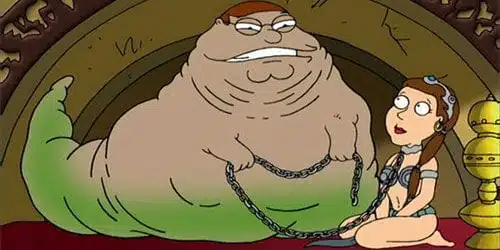
Pop culture certainly loves itself, and there’s no sitcom that celebrates and lambastes our own poppy fascination quite like Family Guy (well, except the Critic, of course). For five full seasons now, Peter, Stewie and the rest of their two-dimensional universe has popped their way into our hearts by making every reference possible — from the obvious to the obscure — all smushed within an amorphous amalgamation of fart jokes, sex gags, ethnic humor, and other second-rate stand-up material.
Led by ringleader Seth MacFarlene, and armed with ardent fans who’ve repeatedly saved the show from cancellation, Family Guy has successfully carved its niche in the television market. And judging by its Nielsen-tastic 10.7 million viewers for the season-six premiere, “Blue Harvest”, its appeal doesn’t seem to be slowing.
“Blue Harvest” is a George Lucas-endorsed parody of the first Star Wars film: A New Hope. As Peter gibes in the introduction, “Let us begin with part four.” The episode was spawned from repeated legal talks with LucasFilm about the large number of Star Wars references — Family Guy has made over its 100+ episodes. After a full year of production, the finished product spans 45-minutes and features the stock Family-Guy affair – but this time they’re in space!
Though the episode’s motivation is cause for question, the questionable aspect of the episode’s humor is its narrative format. Instead of invoking a more traditional parody style of an original narrative in the spirit of the film it parodies, ala Airplane!, “Blue Harvest” is a virtual shot-for-shot recreation of A New Hope but with jokes thrown in. This basically comedic remake of A New Hope has trouble finding its voice through all its admiration. Though the gags run the usual gamut from wildly original (Peter deciding to take a discarded couch he finds in the Death-Star trash compactor), to the profoundly inane (Didn’t Mel Brooks already do the flaccid lightsaber gag 20 years ago?), the episode’s ultra-reverence burdens it heavily.
A successful parody has to balance between an admiration of the work and an understanding of the humor found within it. If you tip the scale too far in either direction, you can run the risk of either alienating your audience, or just not being funny. Skilled parodists like Mel Brooks or Abrahams and Zucker have mastered the art of looking at the model, admiring its parts, then smashing it to bits. Police Squad! is delightfully absurd, but pays strict homage to the noir it pokes. As does Blazing Saddles to westerns. However, even these experts falter on occasion; just look at the oft maligned Dracula: Dead and Loving It. The rigid plotline of the Dracula myth hinders the film’s ability make us laugh.
On the same side of this respect spectrum (or “Respectrum”), “Blue Harvest” comes so close to the original film, the writers are left little room for truly inventive jokes. The best lines are the ones that jab at the minor inconsistencies in the Star Wars universe. Why would Storm troopers not explore a door simply because it’s locked? Why wouldn’t the Death Star laser room have railings and other silly shortcomings? Though Star Wars diehards will “lol” ‘til they “l[t]ao” at these inside references, there’s little else for others to latch onto. A less stringent adaptation, still including the gorgeously animated exterior shots, would have allowed for less punch pulling. The most the plot strays from A New Hope is the addition of Obi Wan Kenobi as a child molester – an easy, half-written joke.
The Family-Guy staff’s overzealous attachment to Star Wars is never more clear than in the DVD-included interview of George Lucas by Seth MacFarlane. Totally defying irreverent expectations, all envisaged humor is absent from this fawning interview. MacFarlane does an unintentional James Lipton impression and lobs softball after softball to geekdom’s homerun king. The interview is about ten minutes of MacFarlane drooling while Lucas answers the same questions he’s been answering for the last 30 years. Most likely, the pop culture attachment to youth and nostalgia, an attachment Family Guy has cashed in on time and time again, is at fault here.
And with good reason: Family Guy has been persistently marauded for its lack of evolution and reliance on its familiar cadre of jokes. If my closest contemporary were South Park, I’d probably look like a Cro-magnum, too. But stasis means something to me, a mere high-schooler when the show began. I’ve grown up so much since then; why hasn’t Family Guy grown with me? I laugh at South Park just as hard now as I did when I was in middle school. Whereas Family Guy appears to be walking the wrong way on a conveyor belt. Consistently reasserting itself as the show that shouldn’t need to change.
The best analogy I can muster for “Blue Harvest” is this: it’s like watching Gus Van Sant’s Psycho screened on Mystery Science Theater 3000. You’re confused, annoyed, not sure when to laugh, and constantly questioning why you’ve distanced yourself so far from the original masterpiece. Instead, just open up the cabinet and pop in your old Laserdisc of the best triptych since The Divine Comedy.
